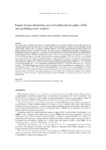Impact of musculoskeletal pain on health-related quality of life among fishing sector workers

Use este enlace para citar
http://hdl.handle.net/2183/15731Colecciones
- Investigación (FFISIO) [481]
Metadatos
Mostrar el registro completo del ítemTítulo
Impact of musculoskeletal pain on health-related quality of life among fishing sector workersFecha
2014-03-20Cita bibliográfica
Rodríguez-Romero B, Pita-Fernández S, Pértega-Díaz S. Impact of musculoskeletal pain on health-related quality of life among fishing sector workers. Clin Rheumatol. 2015 Jun;34(6):1131-9.
Resumen
[Abstract] This study aims to determine the impact of musculoskeletal pain (in terms of intensity of the pain, location and functional disability due to back pain) and other factors (socio-demographic, lifestyle and co-morbidity) on the health-related quality of life on a group of shellfish gatherers. This observational transversal study included 929 shellfish gatherers (18–69 years, 98.7 % women) who completed a self-administered questionnaire, including socio-demographic and lifestyle questions, co-morbidity, intensity and location of musculoskeletal pain, and Roland-Morris Disability Questionnaire (RMDQ). Health-related quality of life was assessed using the 36-item Short Form Survey (SF-36). Physical component summary (PCS) and mental component summary (MCS) of the SF-36 were considered as outcome variables. The impact of the different factors on the PCS and MCS scores was evaluated using a stepwise linear regression analysis. Physical health was found to be independently associated to intensity of musculoskeletal pain (regression coefficient, B = −0.96), number of locations with musculoskeletal pain (MSP) (B = −0.77), presence of pain in the hip-knee (B = −2.26), self-reported rheumatic disorders (B = −2.79), lower back pain (B = −1.62) and age (B = −0.06). Mental health was associated with the presence of self-reported depressive syndrome (B = −1043.1) and RMDQ score (B = −42.2). The sample had significantly lower values than the reference population in all of the dimensions of the SF-36. Intensity of the pain, pain in the hip-knee, lower back pain, functional disability due to back pain and number of locations with musculoskeletal pain were found to have a detrimental impact on the physical health of the workers. Depressive syndrome and greater functional disability due to back pain, in turn, predict worse mental health.
Palabras clave
Disability evaluation
Health status
Muskuloskeletal diseases
Quality of life
Health status
Muskuloskeletal diseases
Quality of life
Versión del editor
Derechos
The final publication is avaliable at Springer Link





